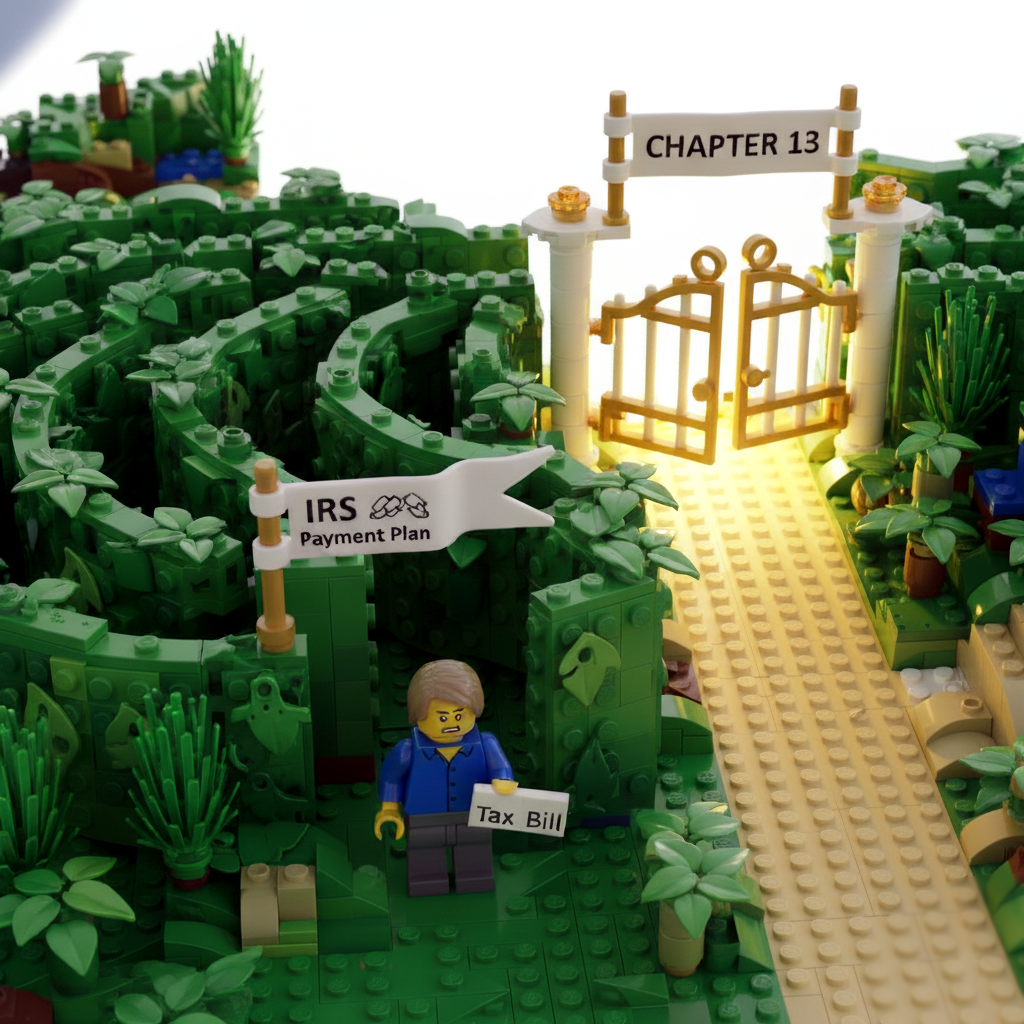Now that April 15th has come and gone, millions of Americans have exhaled a collective sigh of relief — unless, of course, you still owe the IRS. If you’re one of the unlucky taxpayers now staring down a balance due (and perhaps a love letter from the IRS marked “Final Notice of Intent to Levy”), you may be weighing your options:
- Should you set up an IRS installment agreement?
- Or, is it time to consider the “B word” — bankruptcy?
Let’s get one thing out of the way: nobody dreams of filing bankruptcy. It’s not exactly on anyone’s bucket list, right between “learn to salsa dance” and “visit Italy.” But sometimes, when life, inflation, and interest rates conspire against you, bankruptcy may actually offer a more dignified, efficient, and final solution than endlessly negotiating with the IRS.
The Big Picture: IRS Payment Plan vs. Chapter 13 Bankruptcy
Under an IRS installment agreement, the taxpayer promises to pay every penny owed — plus the ever-growing pile of penalties and interest — under terms the IRS dictates. Think of it as being invited to play a game where the IRS wrote the rules, referees the match, and keeps the scoreboard.
By contrast, Chapter 13 bankruptcy flips the script. Instead of the IRS deciding what’s “reasonable,” a Bankruptcy Court steps in, supervised by a judge who doesn’t work for the IRS. And your lawyer — not some anonymous IRS agent — advocates for your budget, your repayment terms, and your fresh start.
Let’s break down some of the advantages of Chapter 13 over an IRS payment plan.
1. You Might Not Have to Pay the Whole Tax Bill
Under an IRS installment agreement, you owe it all. Every dime. No exceptions.
Under bankruptcy, however, some tax debts can be reduced — or even wiped out entirely. Certain older tax debts, depending on timing and compliance factors, can be discharged just like credit card balances. In other words, the Bankruptcy Code sometimes tells the IRS, “You’ve had your turn — this debt is done.”
2. Interest and Penalties Hit the Pause Button
If you’ve ever watched your tax balance grow like a Chia Pet, you know the pain: interest and penalties never take a day off. Under an IRS payment plan, that meter just keeps running.
But once you file a Chapter 13 petition, the interest stops accruing as of that day, unless the underlying tax claim is secured. In addition, ALL unsecured tax penalties are discharged, a huge benefit over an Installment Agreement. Thus, every dollar you pay reduces your tax balance. No hamster wheel. No surprise growth spurts. And when you finish the plan — typically within five years — you walk away debt-free.
3. You Get to Live by Your Budget, Not the IRS’s
When setting up an IRS payment plan, the IRS applies what it calls “allowable living expenses.” It’s a polite way of saying, “We’ve decided what you can afford — and we’re not asking for your opinion.”
In Chapter 13, by contrast, your actual living expenses matter. The court considers your true financial reality — rent, childcare, gas, groceries, and yes, the occasional pizza — to determine what you can reasonably pay. For many people, this results in a payment plan that’s more humane and sustainable.
4. The IRS Has to Play Nice (or at Least, Ask Permission)
Under an installment agreement, if you miss a payment or sneeze the wrong way, the IRS can terminate the agreement and seize your assets faster than you can say “Notice of Levy.”
In bankruptcy, that kind of behavior is off-limits. Once you file, an automatic stay goes into effect. The IRS can’t garnish, levy, or harass you without first getting approval from the bankruptcy judge. In other words, for the duration of your Chapter 13 plan, you’re the one with legal protection, not the IRS.
5. There’s a Light at the End of the Tunnel (and It’s Not an Oncoming Auditor)
Under an IRS installment agreement, payments can feel endless — especially as interest and penalties keep piling up. But Chapter 13 has a clear finish line: a five-year maximum repayment plan, after which any remaining eligible debt is gone. That’s it. No extensions, no “forever plans,” no moving goalposts.
So, Is Bankruptcy Right for You?
Filing for bankruptcy is a serious decision. It’s not for everyone — and it’s not something to rush into after one bad tax season. But for many honest taxpayers overwhelmed by IRS debt, bankruptcy can be the tool that finally restores peace of mind.
Every situation is unique. Some taxpayers qualify for Chapter 7 “straight” bankruptcy and can discharge all of their tax debt without repayment. Others may benefit more from a structured Chapter 13 plan that stops the bleeding, keeps the IRS in check, and pays what’s fair — not what’s impossible. This is especially the case if most of the tax debt is recent.
Since 2022, Our Firm Has Helped Taxpayers Get a Fresh Start
At Tax Workout Group, our tax-bankruptcy attorneys—who include former IRS attorneys—help individuals and families across the United States find real, lasting solutions to their tax and financial problems. We’ve represented clients in Chapter 7, 13, and 11 cases and litigated complex disputes over whether tax debts can be discharged.
If you’re tired of feeling like the IRS is the boss of your paycheck, we invite you to schedule a FREE confidential consultation. We’ll help you understand your options, explain whether bankruptcy could work in your situation, and map out a plan toward genuine financial relief.
After all, everyone deserves a second chance — even with the IRS.
